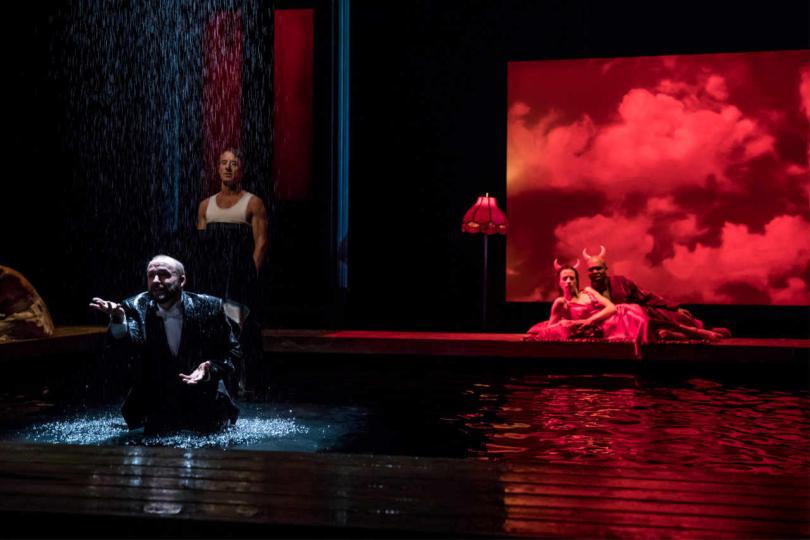A perfect work 2000 years in the making

What did you do Sunday night? I’ll dare take a wild guess that you watched Game of Thrones. And I’ll speculate further that you wouldn’t have dared miss that particular episode because it promised to be the ultimate battle between the dead and the living. The very existence of the races of men was on the line. And if the races of men were to survive they would surely have to set their differences aside and work together, tacitly answering the question of whether our human nature is one of humble cooperation or arrogant annihilation. I haven’t seen episode three yet because I was at the Guthrie with 1100 other people experiencing a different grandiose story. Whether you prefer your mythological stories in the form of live stage plays or television with CGI dragons we’re all enamored with myths. We all love larger-than-life stories that dare pose questions of our fundamental nature. Metamorphoses is a theatrical work of the highest caliber. It is both avant-garde and intentionally antiquated. It feels both like a bold new advancement and like a humble stepping stone in a tradition of storytelling.
If you’ve heard anything about this piece it’s probably the fact that most of the play takes place in a 1500-gallon pool specially constructed for this show. The pool is an incredible spectacle. It’s beautiful and surreal and a feat of engineering but the most impressive thing about the pool is that it makes perfect sense for the entirety of the piece. In addition to the visually stunning water, the stage is completed with a grand chandelier, a giant door to nowhere, and a huge canvas of painted sky. On this familiar looking yet fantastical stage, Metamorphoses is essentially a revue of Greek and Roman mythology. It’s a collection of unrelated stories that perfectly relate to one another. The dozen(ish) stories are the familiar legends and parables of Midas, Aphrodite, Orpheus, Eurydice and the like. Through sheer theatrical mastery these stories feel brand new. Not just ‘brand new’ compared to their 2000 year shelf life but ‘brand new’ as in… these stories are perhaps the clearest possible descriptions of the human condition.
Using source material from Ovid, Mary Zimmerman first created this work in 2001. In the interim 18 years it’s had success in venues across the country. I wasn’t previously familiar with Mary Zimmerman’s work but I now view her as a master of her craft. In Metamorphoses, there isn’t a single plot but the arc of a story still feels perfectly fulfilled. With expert pacing from familiar (using much colloquial language) to humorous (with perfect physical humor) to serious to dark to existential the show has the feeling of a complete story without having a plot you can hold in your hand. As someone who loves a clear plot, this feels like a small miracle. Typically, a story works when the audience gets invested in a character and goes on a journey of their successes and failures until we eventually see that they’ll live some version of happily ever after. With no consistent characters, this show works for a magically simple reason… that even though the characters change, we’re rooting for some consistent invisible protagonist the whole time. Perhaps the protagonist is each audience member ourselves, or perhaps the person we love most or perhaps it’s humanity as a whole. Whatever the case, the clarity of this story with a rotating cast of characters is astounding.
Without spoiling anything, here are some of my favorite moments to look for:
· The story within a story of Myrrha and Cinyras
· Orpheus pleading with Hades as rain soaks his wedding-day garb
· The two tellings of the tale of Orpheus & Eurydice, each more heart-wrenching than the last
· The silent 1-minute tale of Echo and Narcissus
If you don’t know any of these crazy names or remember any of these stories, don’t worry. Each is presented with remarkable clarity that demands no prior knowledge. Also, if you have any shred of doubt as to why these stories matter, you won’t by the time you leave the theater. The explanation of this show’s relevance is self-contained in a way I’ve never seen before. Both in moments of poetic dialogue (‘…it has been said that myths are public dreams and dreams are private myths…having lost touch with this, we no longer understand our actions’) and in the magnetism between the lines, Metamorphoses is telling us that the point is not to wrap your mind around the story and completely understand it but to wrap your arms around it and embrace it, or rather, to let it embrace you. To get swept up in it and go where it takes you and let yourself empathize with Midas in one moment, Orpheus in the next, and the man who believes in nothing in the moment after that.
Writing in my tiny reviewer notebook in the dark of the theater, I was about to write that this is the perfect show to bring your family members to. It’s accessible but a little challenging in its existential nature, it’s visually stunning but demands no prior knowledge, it might be the perfect outing for the family. …and then a fully naked angel-man comes out. So I maintain that it’s still a masterpiece but be aware of the naked fellow before you invite your grandparents.
Here’s a question I have: Why is there a trend of myths right now? Perhaps the trend isn’t everywhere but Hadestown has just graduated from being the masterpiece of my favorite songwriter to being a Broadway success. Also, I recently played in a performance of Myths & Hymns which is something of a musical theater cult classic. I was wondering why this trend exists and then characters in Metamorphoses answered my questions so clearly with quotes like:
“Is this story a story of love and how it always goes away? Is it a story of how time can move only in one direction? Is this story the story of an artist and the loss that comes with sudden self-consciousness?”
“Let me not outlive my own ability to love.”
COME ON! Any context that allows for this masterful poetic language is cool with me. In case the millennia-old history isn’t convincing enough, I’m declaring that myths are here to stay.
As I was riding the epic escalator down to the Guthrie lobby I was filled with a sense of calm confidence. The arc of Metamorphoses seems to say that each of us can take heart that we’re fundamentally in it together. We have the same desires and needs. We have the same fears and we make the same mistakes. We like hearing the same kind of stories and we have the same boundless capacity to love and be loved. I walked to my car with reassurance that these actors and this writer and a few thousand years of storytelling were all telling me ‘it’s ok, you don’t have to figure this out alone, we’re all here together.’ So go see this masterpiece of a show even if you have to watch Game of Thrones a day late.




